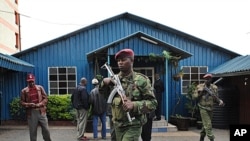Human Rights Watch says the Kenyan police and army subjected hundreds of ethnic Somalis and Somali refugees to beatings and other abuses between November 2011 and February 2012. The alleged abuses were in apparent response to attacks carried out by militants with suspected links to the Islamist Somali armed group, al-Shabab in the wake of Kenya's military intervention in Somalia.
Speaking to journalists in Nairobi, Human Rights Watch East Africa Researcher Neela Ghoshal accused the Kenyan security forces of arbitrarily arresting and mistreating ethnic Somalis in Northeastern Kenya rather than conducting investigations to identify individuals targeting security forces and civilians.
"Our particular concern which we have documented in this report is the response to those attacks by the security forces," said Ghoshal. "Rather than doing what they ought to do which is to investigate each of the attacks carry out careful policing and intelligence work and identify the perpetrators or the suspects and bring them to justice process involving the rule of law. But what has happened instead is arbitrary round up of residence in Northeastern province."
The organization also documented cases rape and attempted sexual assaults, looting and destruction of property. According to Ghosal, there are were also cases of degrading and inhumane treatment.
"I myself was in Garissa in January to document the abuses that had taken places in November and December, but what I ended up seeing were abuses taking place in front of my eyes while driving past military camp," added Ghoshal. "We saw people were being grabbed from the street outside brought to the military camp it's in an open field and you could see people being forced to roll on the mud, they were being forced to frog jump across the field and stand on one arm and one leg and this I saw with my own eyes."
Kenya has witnessed a series of grenade attacks since Kenya Defense Forces joined in the effort to battle the militant group al-Shabaab last October. Ghoshal said the attacks carried out by suspected al-Shabaab sympathizers against security forces and civilians were abhorrent, but police and military could never justify indiscriminate attacks and abuses against civilians.
Mohamed Nur Hussein, of the Wajir Paralegal Network, says security officials have been abusing his people since independence. He says the difference now is they are able to tell the world those abuses.
"Since 1963 when Kenya gained independence to date, we are in this kind of harassment, brutality, discrimination, segregation, even in terms of development and economic empowerment the only difference now we are able to speak," Hussein recalled.
In an interview with VOA, deputy police spokesman, Charles Owino said the criticism is constructive but he says but alleged victims should also bring their concerns to the police and not just to rights organizations.
"We take criticism quite positively. But this doesn't mean that we agree wholesomely to the criticism as they put," Owino said. "We have tendencies of communities having various culture where by an offense can be committed but the person fear to report this offenses to police because may be nature of their society."
Human Rights Watch says while little or no action has been taken to address the alleged abuses, but they have subsided because since February, there have been no attacks targeting security forces.
But the New York-based rights organization noted the alleged reprisals against ethnic Somalis have contributed to increased mistrust of the security forces at a time when Kenyan authorities need their cooperation for ensuring the security in that part of the country.
HRW: Kenyan Police, Soldiers Abusing Somalis








